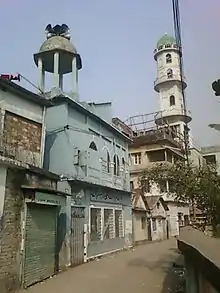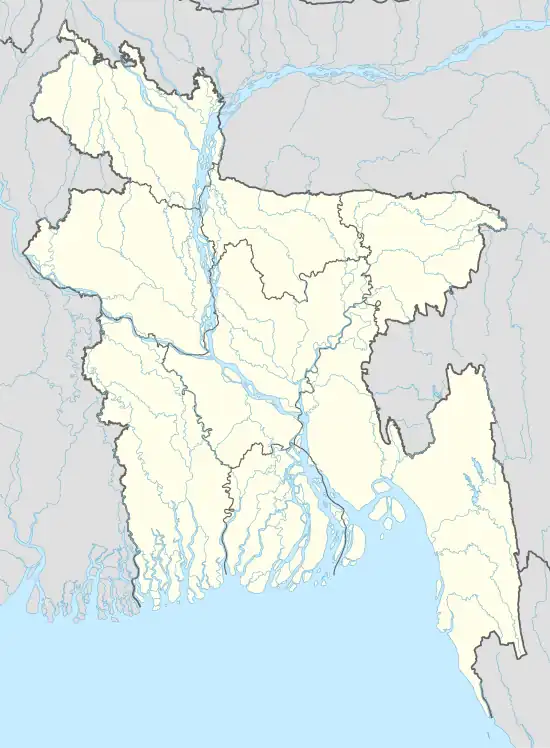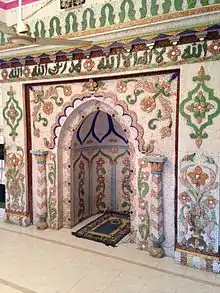| Asrafia Jame Masjid | |
|---|---|
Bengali: আশরাফিয়া জামে মাসজিদ | |
 A front view of the Asrafia Jame Masjid (painted blue) | |
| Religion | |
| Affiliation | Hanafi |
| Sect | Sunni |
| Location | |
| Location | 10 K B Shaha By Lane, Amlapara, Narayanganj, Bangladesh |
 Shown within Bangladesh | |
| Geographic coordinates | 23°37′20″N 90°30′13″E / 23.6223°N 90.5035°E |
| Architecture | |
| Style | Mughal |
| Founder | Rahim Bakhsh Haji, Ahladi Bibi[1][2] |
| Completed | 1890 |
Asrafia Jame Masjid (Bengali: আশরাফিয়া জামে মাসজিদ, Arabic: جامع الأشرفية), previously known as the Mosque of Ahladi Bibi, is a mosque located in the urban neighbourhood of Amlapara, in the city of Narayanganj, Bangladesh. It was built during the British Raj colonial period, dating back to the 1890s.
History

The Asrafia Jame Masjid is one of the oldest mosques in the Narayanganj District. On 20 April 1898, a Bengali Muslim zamindar by the name of Rahim Bakhsh Haji (1857-1935) [3] and his wife talukdar Ahladi Bibi officially purchased Zamindari Portion from Harendra Kumar Roy Chowdhury, the Zamindar of Baliati.[4] Later, Haji and his wife decided to donate a portion of land in Amlapara to serve as a charitable endowment and a place of worship. The mosque was named after the wife as "Ahladi Bibir Masjid". Over time, the name changed to Asrafia Jame Masjid. The mosque has been found recorded in the British map (C S Parcha).
After renovations in 2002, the mosque lost much of its past heritage, architectural style and decorative style. At present, there is nothing remaining from the original mosque except the dome, mihrab and minaret.[5]
Architectural elements and style
Although the mosque was constructed in the colonial period, the structure followed the style of Mughal architecture. It was built as an extremely tall single-storied mosque with great emphasis on the vertical qualities. There are small four domes in the four sides of the roof. A mihrab is located in the western wall, stood from the base of the ground floor to one-third of the height of the first floor. It contains the Shahada written in Arabic calligraphy with glass and stone-flowing Mughal styles. The mihrab's design is made of pieces of glass and stones of five colours; blue, green, yellow (light matte), brown and white.[6] The architecture of the mosque is defined by a combination of embellishments and proportional adjustment among elements such as arches, domes, mihrab etc.
References
- ↑ "The Bearer Of The Tradition And Historical Mosque Asrafia Jame Masjid". Daily Nagar Sangbad. 28 August 2021.
- ↑ "Asrafia Jame Mosque, Narayanganj". Teachers Bangladesh Government Site. 31 August 2020.
- ↑ "Partition History & Museum". Archived from the original on 2020-11-11. Retrieved 2020-11-11.
- ↑ "Baliati Zamidar Bari". Daily Asian Age. 1 October 2016.
- ↑ Mridha Ratul, Shahriar Hasan (16 August 2019), "চলো "আল্লাদী বিবির মসজিদ" এর গল্প শুনি।", Save the Heritages of Bangladesh [Come, let us hear the story of Alladi Bibi's mosque.] (in Bengali)
- ↑ কী আছে আল্লাদী বিবির মসজিদে? [What is inside the Mosque of Alladi Bibi] (YouTube) (in Bengali). Amlapara: Ekattor TV. 6 June 2018. Retrieved 23 June 2018.
External links
- Khan Ujjal; Ghulam Ashraf (11 July 2015). অন্যান্য স্থাপত্যশৈলীর প্রাচীন মসজিদ. Samakal (in Bengali). Archived from the original on 24 September 2015.
- Ancient Mosque in Bangladesh, Daily Inqilab, 9 July 2015
_002.jpg.webp)